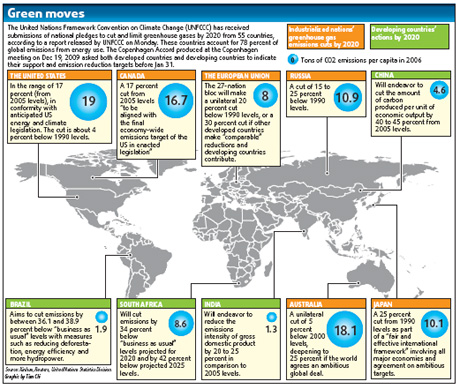67 nations pledge emissions cut
One day after the Jan 31 deadline, 67 countries have signed the United Nations climate agreement aiming to reduce global carbon emissions and fund adaptation measures in developing countries, according to the Union of Concerned Scientists (UCS).
So far, the signatories, which include China, the United States and the EU, make up 78 percent of global emissions, said the UCS, a science-based nonprofit organization based in the US state of Massachusetts.
"This represents an important invigoration of the UN climate change talks under the two tracks of Long-term Cooperative Action under the Convention and the Kyoto Protocol," said Yvo de Boer, executive secretary of the United Nations Framework Convention on Climate Change.
"The commitment to confront climate change at the highest level is beyond doubt. These pledges have been formally communicated to the UNFCCC. Greater ambition is required to meet the scale of the challenge. But I see these pledges as clear signals of willingness to move negotiations towards a successful conclusion," he said.
January's deadline is not mandatory, according to the UNFCCC Secretariat. The next round of formal negotiations is scheduled to be in Bonn, Germany, at the end of May.
The Copenhagen Accord, unveiled at the climate summit in that city on Dec 19, 2009, asked both developed and developing countries to indicate their support and emission reduction targets before Jan 31.
Goals on reducing greenhouse gases announced by major industrialized nations are a step forward but not enough to forestall the disastrous effects of climate change by mid-century, UN officials pointed out.
Janos Pasztor, Secretary-General Ban Ki-moon's top climate adviser, said the goals, submitted to the UN as part of a voluntary plan to roll back emissions, make it highly unlikely the world can prevent temperatures from rising above the target set in December.
More such commitment letters were expected to continue trickling in over the next several days.
"It is likely, according to a number of analysts, that if we add up all those figures that were being discussed around Copenhagen, if they're all implemented, it will still be quite difficult to reach the two degrees," Pasztor said.
The "two degrees" refers to the Copenhagen target of keeping the Earth's average temperature from rising two degrees Celsius (3.6 degrees Fahrenheit) above the levels that existed before nations began industrializing in the late 18th century. It would be no more than 1.3 degrees C (2.3 degrees F) above today's average temperatures.
The accord, however, included collective commitments by developed countries to provide billions of dollars to help poor countries adapt to climate change. Nations also were encouraged to formally "associate" themselves with the accord after the conference, but no deadline for that action was set.
 |
|
[China Daily] |
The developed countries are "very slow" in fulfilling their climate finance promises made in Copenhagen, said a climate expert in a recent report.
The current status of climate aid financing is "very poor," said Saleemul Huq, a senior fellow at the London-based International Institute for Environment and Development (IIED).
The actions of the developed countries are "very inadequate," and their pace is "very slow," said Huq, co-author of Copenhagen's Climate Finance Promise: Six Key Questions, published by IIED.
At the UN climate conference held in Copenhagen last December, the developed countries have promised to provide $10 billion a year from 2010 to 2012, to be ramped up to $100 billion a year by 2020.
Go to Forum >>0 Comments
 Add your comments...
Add your comments...
- User Name Required
- Your Comment
- Racist, abusive and off-topic comments may be removed by the moderator.
 0
0 






